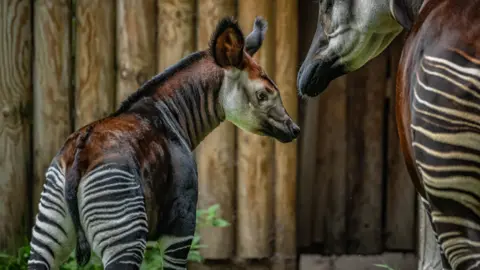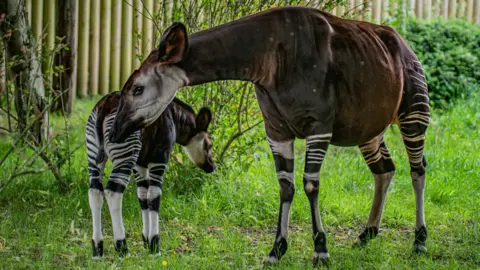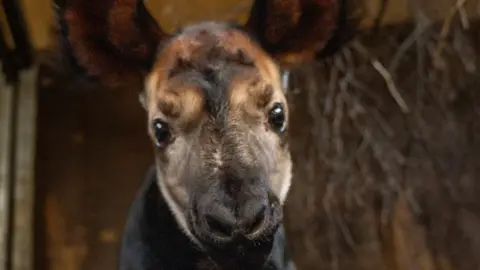Chester Zoo okapi birth will help reveal secrets of species, keeper says
 Chester Zoo
Chester ZooThe "incredibly special" birth of an okapi will help to reveal "one of the least known and understood species on the planet", a keeper has said.
Okapis are only found in the Democratic Republic of Congo (DRC), where about 10,000 remain in the wild.
Chester Zoo said Arabi, a six-week-old female, had been named after a village in DRC's Okapi Wildlife Reserve.
Okapi keeper Hannah Owens said it would be "a real privilege" to watch the "energetic" female calf grow.
She said the calf would become "a vital part of the global population of her species" and was "already showing lots of personality".
"Okapis are one of the least known and understood species on the planet, so every birth is incredibly special indeed," she said.
 Chester Zoo
Chester ZooShe said since being born, Arabi had been "bonding closely with mum K'tusha while snuggled away in her nest".
"Mum has been doing a fantastic job of feeding and nurturing her calf every day, and now that she has a little more confidence, Arabi decided it was time to explore the outside world.
"It didn't take long before she was confidently stretching her legs in the sunshine."
Okapis are also called forest giraffes because of their long necks and zebra-like stripes on their hindquarters, which act as camouflage in their rainforest habitat.
The zoo said their "shy and elusive nature" meant the animals remained a mystery to many up until they were scientifically discovered in 1901.
 Chester Zoo
Chester ZooThe zoo and its partners in the DRC, where the animals are protected by law, have been working to support the last remaining populations of okapi, which is endangered in the wild.
A representative said commercial logging, open-cast mining, agriculture and human settlement had resulted in the loss of the ungulate's habitat and limited access to food and water sources.
They said okapis were also hunted for meat, which is consumed locally, and their skins, which have a high value in the illegal wildlife trade.
Animal and plant director Mike Jordan said the arrival was "not only a cause for celebration, but also a significant milestone in our ongoing commitment to the conservation and protection of this charismatic species".
"Through our continued efforts, we hope to inspire others to join us in safeguarding these remarkable creatures and their threatened habitats," he added.

Why not follow BBC North West on Facebook, Twitter and Instagram? You can also send story ideas to [email protected]
